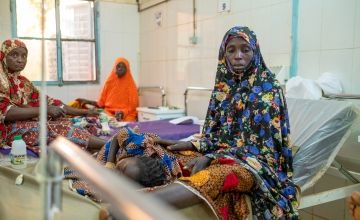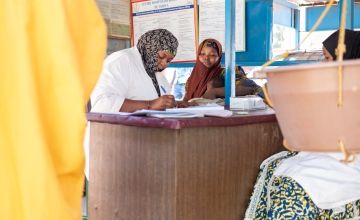
Read our 2023 annual report

Knowledge Hub
World Malaria Day 2024: Progress in reducing disease is 'at a standstill'

Everyone has the right to quality, timely, and affordable services to prevent, detect, and treat malaria, yet this is not a reality for all.
The World Health Organisation (WHO) reports that in recent years, progress in reducing malaria has ground to a standstill.
People living in the most vulnerable situations including pregnant women, infants, children under 5 years of age, refugees, migrants, internally displaced people, and Indigenous Peoples continue to be disproportionately impacted.
Rural populations in the African region living in situations of poverty and with less access to education and essential primary health services are the most impacted.
Intersection of Malnutrition, Measles and Malaria
Diseases of extreme poverty, including malnutrition and measles, and living in conflict affected areas can increase the vulnerability of poorest children to severe malaria and premature death.
Undernutrition weakens the body’s immune system, exacerbating children’s exposure to the negative impacts of measles and malaria especially.
The Oxford, UK, Centre for Tropical Medicine and Global Health research team has recently found that antimalarial treatment was much less effective in children younger than age five, who were very underweight for their height.
This acute malnourishment nearly doubled the risk of treatment failure, compared to children with a normal weight for their height.
Malaria prevention
The main signs and symptoms of malaria are fever, headache and chills, often accompanied with fatigue. Early diagnosis and treatment is essential to save lives.
The best way to avoid malaria is to avoid being bitten by mosquitoes.
This is much harder to do in countries and in environments where there are infected female Anopheles mosquitoes that carry the malaria parasite and bite humans however.
There are 5 Plasmodium parasite species that cause malaria in humans and 2 of these species – P. falciparum and P. vivax – pose the greatest threat. P. falciparum is the deadliest malaria parasite and the most prevalent on the African continent. The infection does not spread from person to person.
Protection for Prevention is critical. Lower one’s risk of getting malaria by avoiding mosquito bites:
- Use mosquito nets when sleeping in places where malaria is present
- Use mosquito repellents (containing DEET, IR3535 or Icaridin) after dusk
- Use coils and vaporizers.
- Wear protective clothing.
- Use window screens.
- Indoor insecticide house spraying to kill mosquitoes / Ministry of Health approved
- Travellers to a malaria risk area can take prescribed chemoprophylaxis drugs
The world’s first Malaria mass Vaccine rollout was started in Cameroon earlier this year, described as ‘an important additional tool’ in this BBC report.
Concern Worldwide's global response to malaria

Of the 26 countries where Concern is currently working, malaria is a high health risk in 20, especially in Burkina Faso, Democratic Republic of the Congo (DRC) and Niger.
In Burkina Faso and in DRC Concern is supporting with outreach health promotion and malaria prevention education for early referral to health facilities with fever among under 5’s so that timely treatment can be provided.
In the 8 health centers in the Ouallam and Simiri communes supported by the Concern project in Niger, the team has committed to almost 60% of the total cost of responding to peaks in the main childhood morbidities including malaria.
In Kenya, Concern with Ministry of Health Trainers has trained 54-health workers on integrated management of child and neonatal illnesses, prioritizing malaria with teams in 12 health facilities in remote areas of Marsabit and Isiolo Counties.
A major challenge in Chad was the under-supply of anti-malarial drugs by donors, and Concern provided the most affected rural health centres with anti-malarial drugs in order to avoid stock-outs. In the Lac province, of the 7,872 women who received antenatal consultations 6,795 (86.3%) received intermittent preventive treatment for malaria. In Sila, of the 739 women attending antenatal consultations 739 (100%) were covered by intermittent preventive treatment against malaria.
Malaria is still a leading cause of death in children and adults in Sierra Leone, and the ‘TAP/Treat and Prevent’ malaria programme in Tonkolili District contributed to the new national strategic plan for National Malaria Control Programme (NMCP)
A total of 145,582 under five children in the Concern Somalia programme were treated for early childhood and critical illnesses including Malaria according to the national Ministry of Health Integrated management of Childhood Illness (IMCI) guidelines.
There was expansion of the Concern supported health programme in South Sudan last year resulting in improved access to health services in hard-to-reach remote locations, particularly for the treatment of malaria. With outreach health education, this facilitates mothers to seek early treatment which prevents dangerous complications in children.
In all Concern supported health programmes, especially in Africa, malaria is afforded highest priority as it remains a major cause of child morbidity and mortality.

Our impact in 2023
people reached through our emergency response
people reached through our health interventions
people reached through our livelihoods programmes

